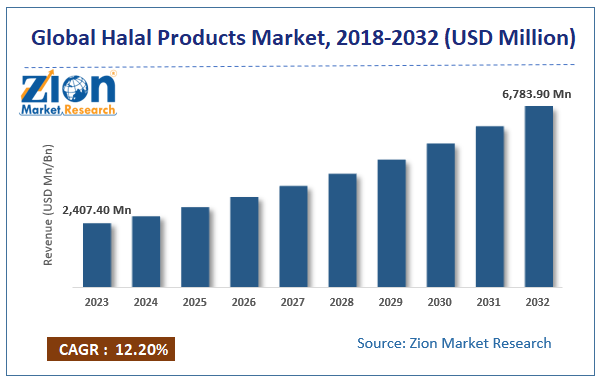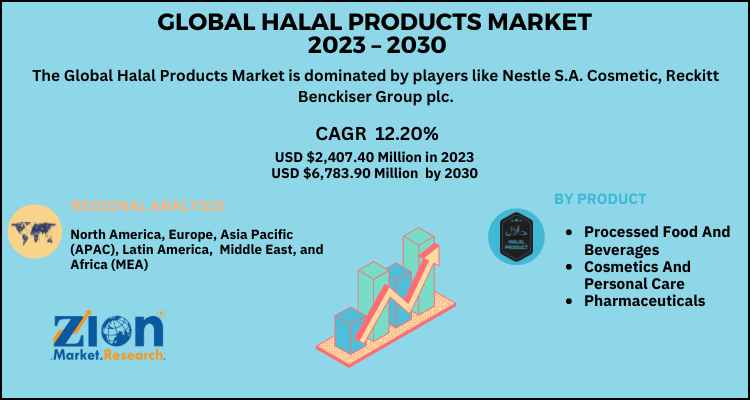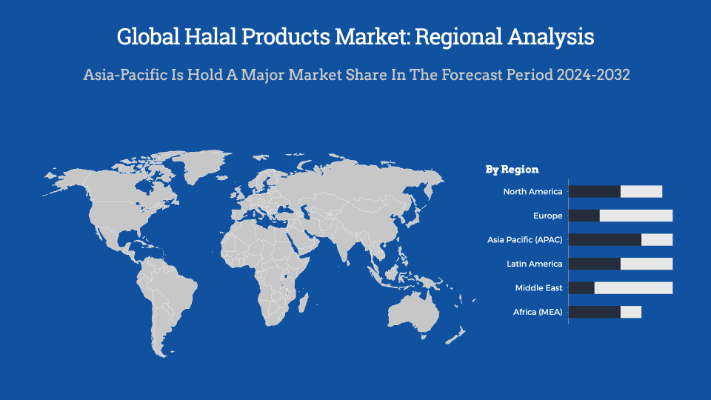Halal Products Market Growth, Size, Share, Trends, and Forecast 2032

Halal Products Market By Product (processed food and beverages, cosmetics and personal care, and Pharmaceuticals), And By Region: - Global And Regional Industry Overview, Market Intelligence, Comprehensive Analysis, Historical Data, And Forecasts, 2024-2032
| Market Size in 2023 | Market Forecast in 2032 | Growth Rate (in %) | Base Year |
|---|---|---|---|
| USD 2,407.40 Million | USD 6,783.90 Million | CAGR at 12.20% | 2023 |
Description
Global Halal Products Market: Insights
According to the report published by Zion Market Research, the global Halal Products Market size was valued at USD 2,407.40 Million in 2023 and is predicted to reach USD 6,783.90 Million by the end of 2032. The market is expected to grow with a CAGR of 12.20% during the forecast period. The report analyzes the global Halal Products Market’s growth drivers, restraints, and impact on demand during the forecast period. It will also help navigate and explore the arising opportunities in the Halal Products Market industry.
Halal Products Market: Overview
Halal is termed derived from a religious perspective in Islam. It is considered as a directive instruction that needs to be followed in terms of food, drink, and all the necessary things in the day-to-day life. With this belief, several products are introduced through a category named halal products and it has significantly witnessed uphold the demand.
As per OIC (Organization of Islamic Cooperation), halal sub-segment meat product is considered as the most chosen food diet by Muslims. A large number of Muslim and France population consume halal products on daily basis in terms of dietary products and cosmetics.
Halal Products Market: Growth Factors
The global halal products market has grown at an appreciable pace in past years and is projected to choose the way of significant growth in the upcoming years. Changing eating habits, rising disposable income, and the globally rising population of Muslim community around the globe and specifically in the Islamic country are some of the drivers of the halal products market. On the other side, imbalance transparency in terms of the constituents utilized for the personal and pharmaceuticals product is and failing to follow the halal standards by some key players has resulted in hindrance in the global halal products market. The halal products market at initial stage faced lots of uncertainties in terms of production procedure due to dissimilarity in standards. However, it is now turning out to be one of the potential markets for the investment.
Key Insights
- As per the analysis shared by our research analyst, the global Halal Products Market is estimated to grow annually at a CAGR of around 12.20% over the forecast period (2024-2032).
- In terms of revenue, the global Halal Products Market size was valued at around USD 2,407.40 Million in 2023 and is projected to reach USD 6,783.90 Million by 2032.
- Based on the product, the Meat and Poultry this segment holds the largest share in the halal food market. The demand is driven by the increasing global Muslim population and the necessity for meat products prepared according to Islamic dietary laws.
- Based on the region, the Asia-Pacific this region leads the global halal food market, accounting for a significant revenue share. Factors contributing to this dominance include a substantial Muslim population in countries such as Indonesia, Malaysia, and Pakistan, as well as increasing consumer awareness and demand for halal-certified products.
Halal Products Market: Dynamics
Key Growth Drivers
The halal products market is primarily driven by the increasing Muslim population worldwide, which fuels the demand for halal-certified food, beverages, cosmetics, pharmaceuticals, and personal care products. Consumers' growing awareness of halal standards, which ensure ethical sourcing, hygiene, and safety, further boosts market growth. Additionally, the rise of e-commerce and online retail platforms has expanded the accessibility of halal products across regions. Governments and regulatory bodies in various countries are also promoting halal certification and establishing clear guidelines, supporting the market's growth. The increasing preference for halal products among non-Muslim consumers, driven by the perception of higher quality and ethical production, further accelerates market expansion.
Restraints
Despite its growth potential, the halal products market faces several restraints. The lack of standardized global halal certification processes creates confusion among consumers and manufacturers, limiting cross-border trade. Additionally, the high costs associated with obtaining halal certification and ensuring compliance with strict halal standards can be a barrier for small and medium-sized enterprises (SMEs). Limited awareness and misconceptions about halal products among non-Muslim consumers may also restrict market growth. Moreover, logistical challenges in maintaining the halal integrity of products throughout the supply chain can further complicate market operations.
Opportunities
The expanding Muslim diaspora in Western countries offers significant growth opportunities for halal product manufacturers. Increasing government support for halal certification and trade agreements to facilitate halal exports also present favorable market conditions. The growing demand for clean-label and ethically produced products aligns well with halal standards, attracting a broader consumer base. Furthermore, the development of halal-certified pharmaceuticals, cosmetics, and nutraceuticals opens new avenues for market growth. Technological advancements in blockchain and traceability solutions provide opportunities for companies to enhance transparency and build consumer trust in halal-certified products.
Challenges
The halal products market faces challenges related to the lack of uniformity in halal certification standards across different regions, leading to regulatory complexities and trade barriers. Companies may struggle to navigate varying halal regulations in export markets. Additionally, counterfeit halal certifications and fraudulent practices undermine consumer confidence and pose a significant challenge for authentic halal product manufacturers. Intense competition in the market, with both established brands and emerging local players, also creates pricing pressure and limits profit margins. Moreover, ensuring a robust halal-compliant supply chain from sourcing to distribution requires substantial investment and continuous monitoring, adding to operational challenges.
Halal Products Market: Report Scope
| Report Attributes | Report Details |
|---|---|
| Report Name | Halal Products Market Research Report |
| Market Size in 2023 | USD 2,407.40 Million |
| Market Forecast in 2032 | USD 6,783.90 Million |
| Growth Rate | CAGR of 12.20% |
| Number of Pages | 196 |
| Key Companies Covered | Nestle S.A. Cosmetic, Reckitt Benckiser Group plc |
| Segments Covered | By Product and By Region |
| Regions Covered | North America, Europe, Asia Pacific (APAC), Latin America, Middle East, and Africa (MEA) |
| Base Year | 2023 |
| Historical Year | 2018 to 2022 |
| Forecast Year | 2024 - 2032 |
| Customization Scope | Avail customized purchase options to meet your exact research needs. Request For Customization |
Halal Products Market: Segmentation
The halal products market is bifurcated according to the main segment, based on product and region wise. All the segments have been analyzed based on present and future trends and the market is estimated from 2024 to 2032.
Based on the product, the global halal products market is bifurcated as processed food and beverages, cosmetics and personal care, and Pharmaceuticals.
Based on region, the global market is segmented as North America, Asia-Pacific, Europe, Middle East, and Africa. The global halal products market is also bifurcated based on the distribution channels this includes online retailers, mall, brick and mortar stores, and local shopkeepers.
Halal Products Market: Regional Analysis
The Asia-Pacific (APAC) region dominates the global halal products market, driven by its large Muslim population, increasing disposable income, and strong government support for halal certification. Countries like Indonesia, Malaysia, and Pakistan are key contributors, with Indonesia being the world’s largest halal consumer market. The region benefits from well-established halal ecosystems, particularly in food & beverages, cosmetics, and pharmaceuticals. Malaysia, a global halal hub, leads in halal standards and exports.
The Middle East & Africa (MEA) follows closely, fueled by religious adherence and rising demand for certified halal goods. However, APAC’s rapid economic growth, expanding middle class, and proactive halal industry policies solidify its leading position, accounting for the largest market share (over 40%) as of recent industry reports (2024-2032).
Halal Products Market: Competitive Players
As halal products are diversely classified into various segments, every segment of halal products market is dominated by the different market player. The food and beverage segment of halal products is dominated by Nestle S.A. Cosmetic and personal care segment of halal products is controlled by Unilever and other players. While in chemical and material segment Reckitt Benckiser Group plc is the major dominating player.
The Global Halal Products Market is segmented as follows:
By Product
- Processed Food And Beverages
- Cosmetics And Personal Care
- Pharmaceuticals
Halal Products Market: Regional Segment Analysis
- North America
- The U.S.
- Europe
- The UK
- France
- Germany
- The Asia Pacific
- China
- Japan
- India
- Latin America
- Brazil
- The Middle East and Africa
What Reports Provides
- Full in-depth analysis of the parent market
- Important changes in market dynamics
- Segmentation details of the market
- Former, on-going, and projected market analysis in terms of volume and value
- Assessment of niche industry developments
- Market share analysis
- Key strategies of major players
- Emerging segments and regional markets
- Testimonials to companies in order to fortify their foothold in the market.
Table Of Content
FrequentlyAsked Questions
Halal is termed derived from a religious perspective in Islam. It is considered as a directive instruction that needs to be followed in terms of food, drink, and all the necessary things in the day-to-day life. With this belief, several products are introduced through a category named halal products and it has significantly witnessed uphold the demand.
The Halal Products Market was valued at USD 2,407.40 Million in 2023.
The Halal Products Market is expected to reach USD 6,783.90 Million by 2032, growing at a CAGR of of 12.20% between 2024 to 2032.
The global halal products market has grown at an appreciable pace in past years and is projected to choose the way of significant growth in the upcoming years. Changing eating habits, rising disposable income, and the globally rising population of Muslim community around the globe and specifically in the Islamic country are some of the drivers of the halal products market. On the other side, imbalance transparency in terms of the constituents utilized for the personal and pharmaceuticals product is and failing to follow the halal standards by some key players has resulted in hindrance in the global halal products market.
Halal Products Market players such as Nestle S.A. Cosmetic, Reckitt Benckiser Group plc.
HappyClients
Zion Market Research
Tel: +1 (302) 444-0166
USA/Canada Toll Free No.+1 (855) 465-4651
3rd Floor,
Mrunal Paradise, Opp Maharaja Hotel,
Pimple Gurav, Pune 411061,
Maharashtra, India
Phone No +91 7768 006 007, +91 7768 006 008
US OFFICE NO +1 (302) 444-0166
US/CAN TOLL FREE +1 (855) 465-4651
Email: sales@zionmarketresearch.com
We have secured system to process your transaction.
Our support available to help you 24 hours a day, five days a week.
Monday - Friday: 9AM - 6PM
Saturday - Sunday: Closed








